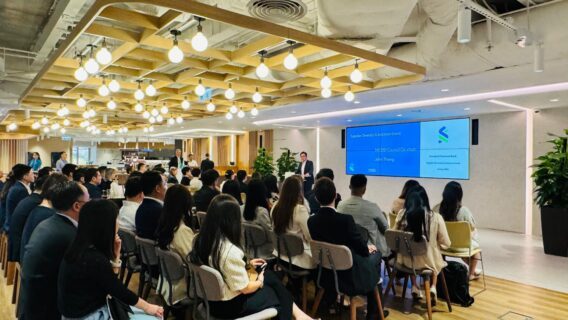-

Sustainability
Sustainability stakeholder engagement
Our approach is shaped by open dialogue with all of our stakeholders.
Why we engage
As a global bank which operates across a diverse range of markets, stakeholder engagement is important to understanding local, regional, and global perspectives that shape our business.
Listening and responding to stakeholders’ priorities and concerns is key to achieving our purpose and delivering on our brand promise, here for good.
We strive to maintain open and constructive relationships with a wide range of stakeholders including clients, governments and regulators, investors, suppliers, civil society, and employees.
Defining our sustainability focus areas
To define our sustainability focus areas, we determined our material topics using the Global Reporting Initiative (GRI 3: Material Topics 2021) approach.
Material topics are those that represent an organisation’s most significant impacts on the economy, environment, and people, including impacts on their human rights – both positive and negative.
To understand the full scope of impacts and key risks and opportunities, we engaged a range of relevant internal and external stakeholders using the approach outlined below:
1. Outlined a high-level overview of our activities and business relationships, presenting the context in which these impacts might occur.
2. Identified actual and potential impacts on the economy, environment, and people. As part of our assessment, we consulted a range of sources for their direct or proxy link to our stakeholders.
3. Assessed their significance using quantitative and qualitative analysis of sub-topics in the context of our activities and stakeholders.
4. Validated our material topics with experts across the Chief Sustainability Officer (CSO) Organisation and prioritised the most significant areas for reporting.
Our material topics include:
• Sustainable finance
• Climate
• Nature
• Human capital management
• Society and community relations
• Data security and privacy
• Corporate governance
For more information on our material topics please refer to page 60 of the 2024 Annual Report.
Our engagement priorities
Our dedicated Sustainability Engagement and Disclosures Team actively engages with the Bank’s key stakeholders to help inform strategy and ensure clear, well-informed, and transparent sustainability-related disclosures.
The team prioritises engagements that align to three key areas.
Our Stands
Our long-term ambitions on climate, financial inclusion and globalisation help us make a difference.
Our footprint markets
We engage with key stakeholders to support sustainable, inclusive growth in our markets.
Our Position Statements
See our cross-sector, sensitive sector and prohibited activities Position Statements.
Engaging our stakeholders
We’re in regular dialogue with our key stakeholders to help us identify and understand environmental and social trends and opportunities in our markets. We share stakeholder feedback internally to senior management through the relevant forums and governing committees, such as the Sustainability Forum, and to the Board’s Culture and Sustainability Committee which oversees the Group’s approach to its main stakeholder relationships. We communicate progress with external stakeholders each year in our Annual Report and our sustainability reports and publications.

How we create value
We want to deliver easy, everyday banking solutions to our clients in a simple and cost-effective way with a great customer experience.
We enable individuals to grow and protect their wealth; we help businesses trade, transact, invest, and expand; and we help a variety of financial institutions – including banks, public sector and development organisations – with their banking needs.
How we serve and engage
Please refer to pages 35-36 of the 2024 Annual Report.
Key topics of interest and engagement
- Differentiated product and service offerings
- Digitally-enabled and positive experiences
- Sustainable finance
- Access to international markets

How we create value
We engage with public authorities to play our part in supporting the effective functioning of the financial system and broader economy.
How we serve and engage
Please refer to our public policy engagement webpage, and to page 36 of the 2024 Annual Report.
Key topics of interest and engagement
- Strong capital base and liquidity position appropriate to a global systemically important bank (G-SIB)
- Robust standards for financial conduct and financial crime
- Competitive economies and markets
- Sustainable finance and net zero transition
- Digital innovation and use of AI in financial services
- Operational resilience
- Market integrity and customer protection
- International and digital trade
- Financial stability

How we create value
We aim to deliver robust returns and long-term sustainable value for our investors.
How we serve and engage
Please refer to page 37 of the 2024 Annual Report.
Key topics of interest and engagement
- Safe, strong and sustainable financial performance
- Facilitation of sustainable finance to contribute to the United Nations (UN) Sustainable Development Goals
- Progress on Environmental, Social and Governance (ESG) matters, including advancing our net zero agenda

How we create value
We are dedicated to engaging with suppliers who offer value-adding goods and services across our network, and we work closely with them to support global environmental and social standards.
Our suppliers are expected to be ethical, respect human rights, diversity and inclusion, and the environment to support our colleagues, clients, and communities.
How we serve and engage
Please refer to page 37 of our 2024 Annual Report and our Supplier Charter which sets out our principles in relation to ethics, human rights, diversity and inclusion, and environmental performance.
Key topics of interest and engagement
- Open, transparent and consistent tendering process
- Accurate and on-time payments
- Willingness to adopt supplier-driven innovations
- Obtain guidance on implementation of sustainability matters

How we create value
We strive to operate as a sustainable and responsible company, leveraging our partnerships, networks and expertise to help transform our markets for long-term societal and environmental impact, create more inclusive economies and increase equitable prosperity.
How we serve and engage
We engage with a wide range of civil society, international and local Non-Governmental Organisations (NGOs), from those focused on environmental and public policy issues to partners delivering our community programmes.
Please refer to pages 38-41 of our 2024 Annual Report and our Futuremakers community engagement program for more information.
Key topics of interest and engagement
- Access to finance
- Economic inclusion
- Gender equity
- Skills-based volunteering
- Community impact

How we create value
We recognise that our workforce is key to driving our performance and productivity and that the diversity of our people, cultures and network sets us apart.
To be the best cross-border and affluent bank to our clients, our workforce composition, including the skills and engagement of our people, is a strategic source of competitive advantage.
We are developing a workforce that is future ready, and are co-creating with our employees to build an inclusive, innovative and client-centric culture.
How we serve and engage
Please refer to page 28 of our 2024 Annual Report, our flexible working approach, our leadership agreement, our approach towards strengthening diversity and inclusion and our gender and ethnicity pay gap analysis in our Diversity, Equality and Inclusion Impact Report 2024.
Key topics of interest and engagement
- Listening to employees
- Driving a culture of sustainable high performance
- Building leadership capabilities
- Developing skills of future strategic value and enabling careers
- Creating an inclusive workplace
- Equal pay, gender and ethnicity pay gaps
We engage with a with a range of agencies on our Environmental, Social and Governance (ESG) approach.
| Organisation | Result (as of December 2024) | Scale (best to worst) |
|---|---|---|
| MSCI | ‘AA’ | AAA to CCC |
| Sustainalytics | 25.0 | 0 to 100 |
| CDP | A- | A to D- |
| S&P Global | 52 | 100 to 0 |
We build our knowledge and understanding of key issues and share best practice through our membership of industry and sector organisations, adoption of global commitments, and implementation of guiding frameworks.
| Membership or initiative | Our involvement |
|---|---|
| #BackBlue | In January 2025, we joined #BackBlue, an Ocean Finance Commitment, which aims to ensure a regenerating and sustainable ocean has a seat at the table in finance and insurance decisions. |
| Center for Climate-Aligned Finance (CCAF) | We formally joined CCAF, which was established by Rocky Mountain Institute, in 2023. We participate in CCAF working groups for the Aviation and Aluminium industries. The Group is a signatory to both the Poseidon Principles, a global framework for assessing and disclosing the climate alignment of financial institutions’ shipping portfolios and the Sustainable STEEL Principles, which helps banks to measure and disclose the alignment of steel lending portfolios with 1.5-degree Celsius climate targets. |
| Climate Bonds Initiative | We are a partner of the Climate Bonds Initiative. |
| Equator Principles | We have been a member since 2003 and actively apply these principles to ensure the projects we finance and advise on are developed in a manner that is socially responsible and reflects sound environmental management practices.¹ |
| Glasgow Financial Alliance for Net Zero (GFANZ) | We are an active participant of the GFANZ Principals Group. Our Group CEO co-chairs the GFANZ working group on Capital Mobilisation to Emerging Markets and Developing Economies. |
| Global Investors for Sustainable Development (GISD) | Standard Chartered co-chairs the United Nations’ GISD Alliance, which has set ambitious objectives to scale up long-term finance and investment in sustainable development. |
| Integrity Council for the Voluntary Carbon Markets (ICVCM) | Our Head of Carbon Markets Development serves on the board of the ICVCM, which is focused on developing high-quality carbon markets. Our Group CEO sits on the Distinguished Advisory Group of the ICVCM, which is involved in the development of carbon markets around the world. |
| Net-Zero Banking Alliance (NZBA) | We are a member of the NZBA – the industry-led, UN-convened and sector-specific alliance for banks under GFANZ. |
| Ocean Risk and Resilience Action Alliance (ORRAA) | In 2023, the Group became a member of ORRAA. |
| Partnership for Carbon Accounting Financials (PCAF) | We joined PCAF in 2022 to support the development of a methodology to measure facilitated emissions associated with the arranging of capital markets issuances. |
| Poseidon Principles | We have been a member of The Poseidon Principles since 2021, an industry initiative aiming to reduce carbon emissions in the shipping sector. |
| Roundtable on Sustainable Palm Oil (RSPO) | RSPO promotes the growth and use of sustainable palm oil products through credible global standards and engagement of stakeholders. |
| Singapore Sustainable Finance Association (SSFA) | We are a member of the SSFA. This was established by the Monetary Authority of Singapore (MAS) and the financial industry to foster closer collaboration across various asset classes in the financial sector and strengthen the nexus with real economy sectors. |
| Taskforce on Nature-related Financial Disclosures (TNFD) | In January 2024, the Group joined a cohort of early adopters of the TNFD framework, preparing to publish our first TNFD-aligned disclosures in early 2026. |
| United Nations Environmental Programme Finance Initiative (UNEP FI) | We’re a signatory of the UNEP FI Statement on Environment and Sustainable Development. |
| United Nations Principles for Responsible Banking (PRB) | Developed by UNEP FI and founding banks, the PRB provides a voluntary sustainable banking framework that can be integrated into banks’ strategies and across their portfolio of activities, bringing purpose, vision, and ambition on sustainable finance to the core of the organisation. Our Head of Sustainable Finance Solutions co-chairs the PRB Adaptation Finance working group, which developed a comprehensive framework and practical guidance for banks to set credible adaptation finance targets. |
| United Nations Global Compact (UNGC) | We are a member of UNGC and support the UNGC’s Ten Principles on human rights, labour, environment, and anti-corruption. |
| World Economic Forum’s Alliance of CEO Climate Leaders | Our Group CEO and CSO are part of the World Economic Forum’s Alliance of CEO Climate Leaders. This is a CEO-led community committed to raising bold climate ambition and accelerating the net zero transition by setting science-based targets, disclosing emissions and catalysing decarbonisation and partnerships across global value chains. |
1. Please see our Equator Principles Reporting.
How to contact us
We review our approach annually and are open to feedback from our stakeholders.
We view constructive conversations as a valuable source of learning, please contact us at sustainability.feedback@sc.com and we will aim to be responsive.
Learn more about our approach to sustainability

Responsible business practices
We strive to be a responsible business, guided by our valued behaviours.

Bespoke sustainable finance
We leverage our deep expertise and suite of over 40 products to help our clients.

Innovating for our markets
We advocate in service of our markets to unlock capital where it’s needed most.

Sustainability library
View our key impact and sustainability reports, including our latest climate change disclosures.